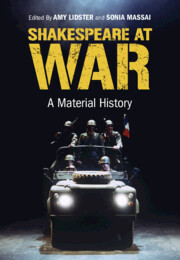Book contents
- Shakespeare at War
- Shakespeare at War
- Copyright page
- Contents
- Figures
- Notes on Contributors
- Acknowledgements
- Note on the Text
- Introduction
- Chapter 1 ‘The Truth for Which We Are Fighting’
- Chapter 2 The Seven Years’ War (1756–1763) and Garrick’s Shakespearean Nationalism
- Chapter 3 Revolutionary Shakespeare
- Chapter 4 Hamlet Mobilized
- Chapter 5 Shakespeare, the North-West Passage, and the Russian War
- Chapter 6 ‘Now for Our Irish Wars’
- Chapter 7 Shakespeare and the Survival of Middle England
- Chapter 8 Ellen Terry Stars at the Shakespeare Hut
- Chapter 9 The 1916 Shakespeare Tercentenary at № 1 Camp in Calais
- Chapter 10 Shakespeare Does His Bit for the War Effort
- Chapter 11 Germanizing Shakespeare during the First World War
- Chapter 12 Readers and Rebels
- Chapter 13 Forgotten Histories
- Chapter 14 ‘Now Good or Bad, ’tis but the Chance of War’
- Chapter 15 ‘Precurse of Feared Events’
- Chapter 16 But What Are We Fighting For?
- Chapter 17 Henry V and the Battle of Powerscourt
- Chapter 18 Unser Shakespeare in Nazi Germany
- Chapter 19 Framing the Jew
- Chapter 20 G. Wilson Knight’s ‘Royal Propaganda’ in ‘This Sceptred Isle’ (1941)
- Chapter 21 Shakespeare’s Desert Camouflage
- Chapter 22 ‘May I with Right and Conscience Make This Claim?’
- Chapter 23 Henry V and the Invasion of Iraq
- Chapter 24 Who Pays the Price?
- Chapter 25 ‘Mere Prattle, without Practice, Is All His Soldiership’
- Chapter 26 ‘Thou Hast Set Me on the Rack’
- Afterword
- Notes
- Index
Chapter 9 - The 1916 Shakespeare Tercentenary at № 1 Camp in Calais
Published online by Cambridge University Press: 17 August 2023
- Shakespeare at War
- Shakespeare at War
- Copyright page
- Contents
- Figures
- Notes on Contributors
- Acknowledgements
- Note on the Text
- Introduction
- Chapter 1 ‘The Truth for Which We Are Fighting’
- Chapter 2 The Seven Years’ War (1756–1763) and Garrick’s Shakespearean Nationalism
- Chapter 3 Revolutionary Shakespeare
- Chapter 4 Hamlet Mobilized
- Chapter 5 Shakespeare, the North-West Passage, and the Russian War
- Chapter 6 ‘Now for Our Irish Wars’
- Chapter 7 Shakespeare and the Survival of Middle England
- Chapter 8 Ellen Terry Stars at the Shakespeare Hut
- Chapter 9 The 1916 Shakespeare Tercentenary at № 1 Camp in Calais
- Chapter 10 Shakespeare Does His Bit for the War Effort
- Chapter 11 Germanizing Shakespeare during the First World War
- Chapter 12 Readers and Rebels
- Chapter 13 Forgotten Histories
- Chapter 14 ‘Now Good or Bad, ’tis but the Chance of War’
- Chapter 15 ‘Precurse of Feared Events’
- Chapter 16 But What Are We Fighting For?
- Chapter 17 Henry V and the Battle of Powerscourt
- Chapter 18 Unser Shakespeare in Nazi Germany
- Chapter 19 Framing the Jew
- Chapter 20 G. Wilson Knight’s ‘Royal Propaganda’ in ‘This Sceptred Isle’ (1941)
- Chapter 21 Shakespeare’s Desert Camouflage
- Chapter 22 ‘May I with Right and Conscience Make This Claim?’
- Chapter 23 Henry V and the Invasion of Iraq
- Chapter 24 Who Pays the Price?
- Chapter 25 ‘Mere Prattle, without Practice, Is All His Soldiership’
- Chapter 26 ‘Thou Hast Set Me on the Rack’
- Afterword
- Notes
- Index
Summary
This essay explores archival materials documenting a gala performance on 2–3 May 1916, which the British officers stationed in a B.E.F. camp in Calais organized to commemorate the three hundredth anniversary of Shakespeare’s death. It focuses on the event’s use of selected scenes from Henry V: the ‘Once more unto the breach’ speech (3.1), Princess Katherine’s English lesson (3.4), and the negotiations surrounding Henry and Katherine’s marriage (5.2). It argues that performing these scenes in a setting that brought together Allied soldiers, French civilians, and the members of a women’s voluntary corps, the First Aid Nursing Yeomanry (FANY), produced ambiguous effects. On the one hand, the production promoted an idealized vision of a post-war patriarchal order, with men as victorious agents and women as sexualized rewards for masculine heroism. On the other hand, the involvement of the FANYs – independent women who wore uniforms and performed tasks previously reserved for men – complicated this picture. Consequently, the Calais Shakespeare gala constitutes a wartime production of Henry V that does not simply promote conventional patriotism. Instead, it creates a space to debate national identity in relation to gendered subjectivity, juxtaposing the established ideals of masculinity and femininity with the reality of women’s increased agency during the global conflict.
- Type
- Chapter
- Information
- Shakespeare at WarA Material History, pp. 91 - 100Publisher: Cambridge University PressPrint publication year: 2023

